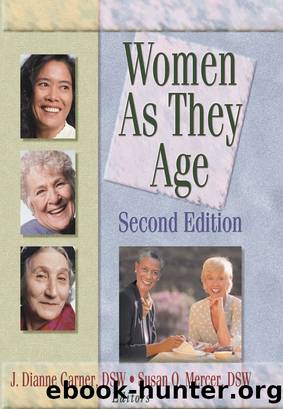Women as They Age by Susan O Mercer J Dianne Garner

Author:Susan O Mercer, J Dianne Garner [Susan O Mercer, J Dianne Garner]
Language: eng
Format: epub
Tags: Social Science, Gerontology, Sociology, General, Women's Studies
ISBN: 9781136615078
Google: 8Sg_fAW9ec4C
Publisher: Routledge
Published: 2012-07-26T05:43:17+00:00
CONCLUSIONS
The lives of older women are made up of a multitude of relationships representing the continuous intermingling of individuals and encounters. Family relationships are considered obligatory with societal and cultural norms guiding expectations for interactions. Friendships, though voluntary in nature, are still influenced by external forces. Other relationships that blur the lines between obligatory and voluntary are without clear societal norms, and are just starting to be explored. For example, remarriage for either older mothers or their adult children creates new relationship opportunities with stepchildren (Ganong et al., 1998) and step-grandchildren (Ganong and Coleman, 1998). In addition, almost 50 percent of grandparents will become great -grandparents, yet very little is known about the meaning and function of this relationship whose members are potentially separated by more than a half century.
The exchange of instrumental and emotional support is characteristic of most relationships. The type, frequency, and amount of support provided or received varies based on a variety of factors, including individual needs and abilities, the type of relationship, personal resources, and cultural beliefs. When the need for support of a member of a reciprocal relationship becomes a requirement for daily well-being, a distinctive type of supportive relationship emerges-that of care giving. As wives, partners, mothers, daughters, and siblings, and regardless of race, ethnicity, or class, older women frequently find themselves enmeshed in care giving relationships. Much of the caregiving literature focuses on individual outcomes for women providing care (e.g., stress, burden, depression). Researchers need to focus more on the relationship dynamics between women and their care receivers, secondary caregivers, and others in their social network.
Complexities and ambiguities within relationships create situations that are not all positive or all negative, and include pleasurable as well as tense interactions. Regardless, older women report high satisfaction with their family and friend relationships. These findings raise some methodological concerns. Huyck (1995), for example, cautioned that the literature on older couples provides a limited view of the marriage experience, as most studies rely on cross-sectional data typically derived from small numbers of geographic, ethnic, and economically homogenous respondents. In addition, she pointed out that few researchers distinguish between persons who are in their first marriage and those who have remarried or examine ways in which ethnicity and culture affect marriage in later life. Many of these same issues permeate throughout the literature on relationships in later life and warrant future attention.
As gerontologists and others continue their studies of family and friend relationships in later life, they must avoid the methodological and analytical pitfalls of the past. Most studies of relationships in later life are atheoretical, lack integration, and give limited attention to gender, race, class, and contextual influences. Only recently have some researchers moved beyond collecting individual level data and extrapolating their findings to dyads, families, and networks (Blieszner, 2000). More studies, using dyadic, family, and network level analytical strategies, are needed to further our understanding of the complexity of older womenâs relationships with family and friends. By merging qualitative and quantitative methodologies, researchers can explore
Download
This site does not store any files on its server. We only index and link to content provided by other sites. Please contact the content providers to delete copyright contents if any and email us, we'll remove relevant links or contents immediately.
Collaborating with Parents for Early School Success : The Achieving-Behaving-Caring Program by Stephanie H. McConaughy; Pam Kay; Julie A. Welkowitz; Kim Hewitt; Martha D. Fitzgerald(899)
Entrepreneurship Education and Training: The Issue of Effectiveness by Colette Henry Frances Hill Claire Leitch(665)
Adding Value to Policy Analysis and Advice by Claudia Scott; Karen Baehler(499)
Materializing the Middle Passage by Jane Webster;(497)
Race and American Political Development by unknow(488)
Sociological Perspectives of Health and Illness by Constantinos N. Phellas(478)
American Government and Politics Today by Steffen W. Schmidt Mack C. Shelley Barbara A. Bardes(477)
Human and Global Security : An Exploration of Terms by Peter Stoett(473)
Control Of Oil - Hardback by Kayal(466)
Advances in Child Development and Behavior, Volume 37 by Patricia J. Bauer(403)
The Disappearance of Rituals: A Topology of the Present by Byung-Chul Han(401)
The Catholic Church and European State Formation, AD 1000-1500 by Jørgen Møller(392)
The World According to China by Elizabeth C. Economy(382)
Theories of Counseling and Psychotherapy: A Case Approach by Nancy L. Murdock(371)
Left Is Not Woke by Susan Neiman(370)
Application of classical statistics, logratio transformation and multifractal approaches to delineate geochemical anomalies in the Zarshuran gold district, NW Iran by unknow(364)
Cross-Cultural Child Development for Social Workers by Lena Robinson(358)
Turkey's Relations with the West and the Turkic Republics: The Rise and Fall of the Turkish Model by Idris Bal(353)
Japan's Ainu Minority in Tokyo by Mark K. Watson(340)
